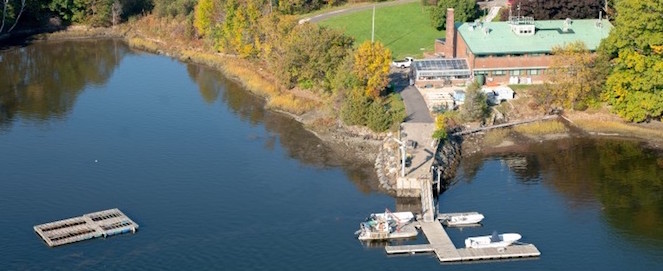
Jackson Estuarine Laboratory
Development of a nutrient pollution indicator using the seagrass, Zostera marina, along nutrient gradients in three New England estuaries
Abstract
Worldwide, seagrasses provide important habitats in coastal ecosystems, but seagrass meadows are often degraded or destroyed by cultural eutrophication. Presently, there are no available tools for early assessment of nutrient over-enrichment; direct measurements of water column nutrients are ineffective since the nutrients typical of early enrichment are rapidly taken up by plants within the ecosystem. We investigated whether, in a gradient of nutrient availability but prior to actual habitat loss, eelgrass (Zostera marina L.) plant morphology and tissue nutrients might reflect environmental nutrient availability. Eelgrass responses to nitrogen along estuarine gradients were assessed; two of these plant responses were combined to create an early indicator of nutrient over-enrichment. Eelgrass plant morphology and leaf tissue nitrogen (N) were measured along nutrient gradients in three New England estuaries: Great Bay Estuary (NH), Narragansett Bay (RI) and Waquoit Bay (MA). Eelgrass leaf N was significantly higher in up-estuary sampling stations than stations down-estuary, reflecting environmental nitrogen gradients. Leaf N content showed high variance, however, limiting its ability to discriminate the early stages of eutrophication. To find a stronger indicator, plant morphological characteristics such as number of leaves per shoot, blade width, and leaf and sheath length were examined, but they only weakly correlated with leaf tissue N. Area normalized leaf mass (mg dry weight cm−2), however, exhibited a strong and consistently negative relationship with leaf tissue N and a significant response to the estuarine nutrient gradients. We found the ratio of leaf N to leaf mass to be a more sensitive and consistent indicator of early eutrophication than either characteristic alone. We suggest the use of this ratio as a nutrient pollution indicator (NPI).
Department
Jackson Estuarine Laboratory, Natural Resources and the Environment
Publication Date
3-1-2004
Journal Title
Aquatic Botany
Publisher
Elsevier Wordmark
Digital Object Identifier (DOI)
10.1016/j.aquabot.2003.09.010
Document Type
Article
Rights
© 2003 Elsevier B.V. All rights reserved.
Recommended Citation
Lee, K., F. T. Short and D. M. Burdick. 2004. Development of a nutrient pollution indicator using the seagrass, Zostera marina, along nutrient gradients in three New England estuaries. Aquatic Botany 78: 197-216. https://doi.org/10.1016/j.aquabot.2003.09.010
